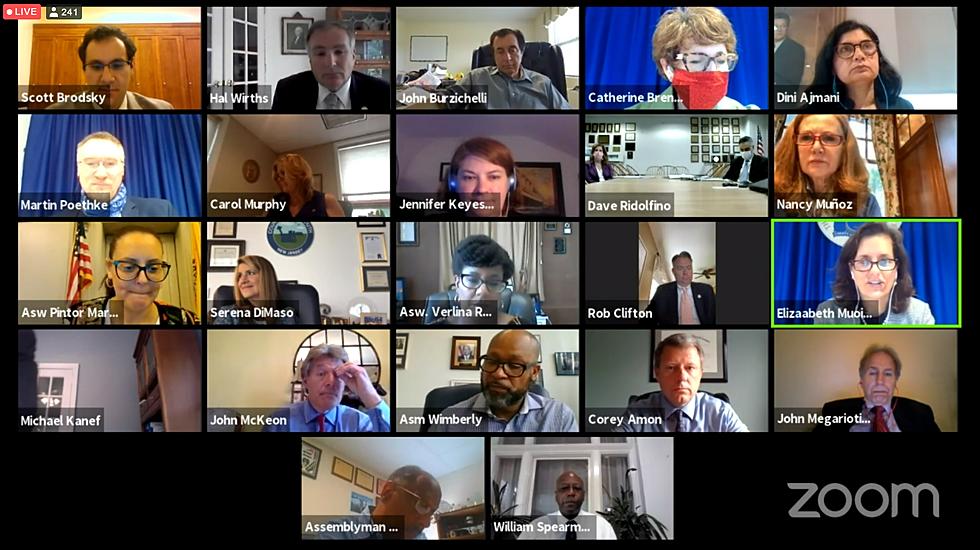
Legislature’s analysts issue slightly less dire revenue outlook for NJ
TRENTON — Nonpartisan budget analysts for the Legislature say the Murphy administration’s projection of a $10 billion decline in revenues through June 2021 is plausible, though they think the near-term forecast is $486.5 million higher than the Treasury Department does.
David Drescher, the Office of Legislative Services’ chief revenue officer, told the Assembly Budget Committee at a Thursday hearing that the state’s updated revenue outlook – down $2.7 billion in the current budget and $7.2 billion in next year’s – is comparable to those in some other states.
“In total our forecast for the extended fiscal year 2020 is approximately half a billion dollars higher than the executive’s,” Drescher said. “That certainly sounds like a lot of money, but it’s fairly small compared to the fairly uncertain $10 billion drop that we’re facing.”
“It’s possible that both of our forecasts could be wrong in a magnitude of the billions of dollars,” he cautioned. “The risk of forecasting error is higher now than it has ever been in our memory.”
The biggest difference between the OLS and Treasury projections centers on the sales tax. The Legislature’s budget office thinks it will be down, but its projections are $360 million higher through September than the executive branch’s.
“We have a somewhat more optimistic view about at least the immediate future of the sales tax,” Drescher said.
OLS revenue analyst Jordan DiGiovanni said sales tax revenues will probably bottom out with this month’s payments, which reflect activity in April, when the shutdown orders were most strict. The revenues this month are expected to be down 29%, after a 14% drop in April payments.
“The theory that we’re working off of is that May is essentially going to be the worst month because most of the state was shut down during the April period,” DiGiovanni said. “May at least halfway through opened back up to similar levels that we saw for part of March. And as we now know, it’s going to continue to open up into June and then who knows when we’re going to be into Phase 3 and the new normal, as per the governor.”
Assemblyman Hal Wirths, R-Sussex, said the Murphy administration could have done more to increase sales tax revenue by reopening nonessential retail stores more quickly. He said it has done “untold damage (by) not allowing the economy to open.”
“The box stores are absolutely mobbed. You can barely get into them. There’s lines out the doors. So I think it kind of shows where people stand as far as if they’re given the opportunity to shop and spend money,” Wirth said. “Obviously what we need to do is get more retailers open.”
State Treasurer Elizabeth Maher Muoio said that even after the stay-at-home order is lifted, the experience in other countries shows that “economic activity does not return to normal as soon as lockdowns expire.”
“It is not a goal of the administration to try and undercut revenues to the extent possible. Clearly that has not been our goal. I don’t want to speak for the governor, but I’m sure that hasn’t been his goal,” Muoio said. “To the extent that stores can open up safely, that’s the priority.”
Drescher said consumer confidence it the best leading indicator for sales tax performance. He said confidence and sales taxes took a dive in April.
“But people are expecting a recovery pretty soon. If that recovery doesn’t come, consumer confidence might go down and our forecasts would probably go down with them,” Drescher said.
“No doubt having more retailers open is going to give customers more opportunities to spend their money, and that would give the state tax revenue,” he said. “The question is when you open up, do the people actually come? Do they feel safe? These are the challenging things we don’t know the answers to.”
Assemblyman John McKeon, D-Essex, expressed some doubt.
“What we’ve seen I think in other states that have opened, Texas and Georgia ... people just haven’t gone back – whether it’s confidence in the economy or confidence in worrying about their health.”
The Office of Legislative Services forecasts that revenues in the 12 months ending June 30 will be $2.35 billion less than the state had anticipated in February, a 6% decline. That’s $383 million higher than the Treasury Department’s current outlook.
For the July-through-September quarter, the OLS forecast is about $104 million higher than what the Murphy administration expects. The state plans to adopt a short-term budget for that period by the end of June and tack it onto fiscal 2020, allowing time to receive delayed tax payments and perhaps more federal aid before its shortened 2021 budget year will begin Oct. 1.
For fiscal 2021, the Treasury Department expects revenues to be $7.2 billion less than its original forecast. About $1 billion of that results from not including in the analysis any of the tax increases Murphy had proposed in Feburary. Those or other tax changes still could be adopted.
The OLS is not forecasting fiscal 2021 revenues at this time. Drescher said too many variables can change in the three months before Murphy has to formally present a revised 2021 budget plan.

More From Beach Radio










